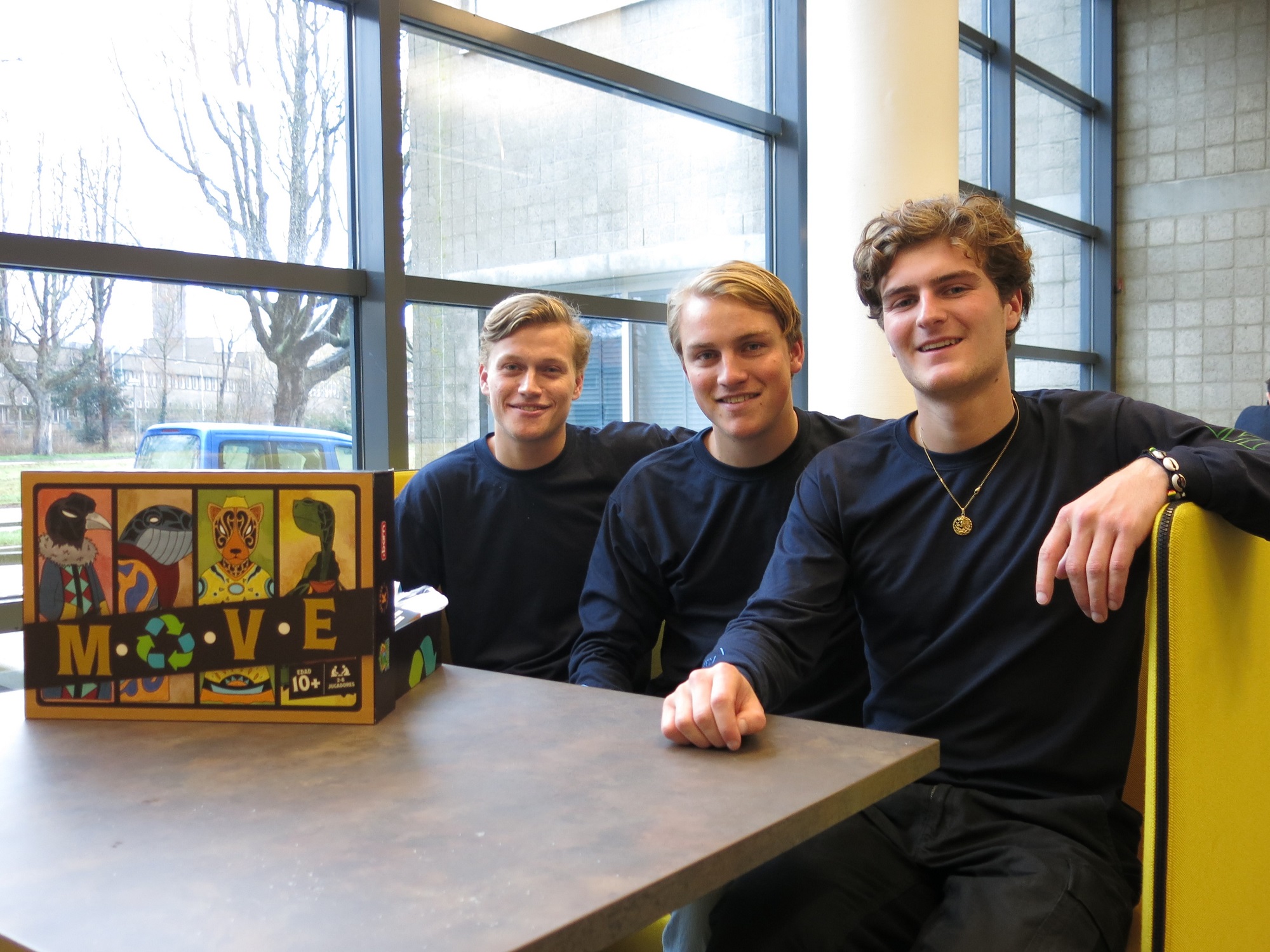How do you teach kids in Ecuador about climate change? Three bachelor’s students created a game that is both fun and educational.
Django Jagt, Lars Oerlemans, and Roger Kalkman (left to right): “We wanted to develop a board game where kids learn about simple things they can do to make their communities more sustainable.” (Photo: Heather Montague)
English only
Through the International Entrepreneurship and Development minor, students Roger Kalkman, Lars Oerlemans, and Django Jagt spent three months in Ecuador. In collaboration with a team from Universidad de Las Américas, they created a board game to help local kids learn what they can do about climate change.
Roger: “I am studying Mechanical Engineering and Django and Lars are both in Aerospace Engineering. We’re all doing the minor in International Entrepreneurship and Development. It started with studying some subjects at the Faculty of Technology, Policy and Management and then we went to Ecuador to start our project. We named it the Climate Awareness Project and we started developing a board game about climate change for children outside the urban periphery of Quito.”
Django: “Our project provider works at the Universidad de Las Américas in Quito. TU Delft and the university there had a project together last year, so that’s when the collaboration started. We could choose between different projects, and there were like twenty options. We all really liked playing games when we were younger and like working with kids and of course we liked Ecuador. That’s how it started.”
Roger – “The quality of education around the world, in this case Ecuador, dropped as a result of Covid. That was our first challenge. The second thing is that here in Europe, we learn a lot about climate change but there they don’t really learn about it. They have some problems there like mudslides and oil leakages into the sea, but the children don’t really learn anything about it. We wanted to develop a board game, something that was fun to play for kids aged around 12 to 13, where they learn about simple things they can do to make their communities more sustainable. It wasn’t about cars and CO2 and that kind of stuff, but it was really based on their communities. That was our way of trying to help the kids learn things like the importance of putting plastic in a certain place and making sure you use less water.”
‘With this game we wanted to stimulate kids to take climate actions’
Django: “We had some brainstorming sessions here in the Netherlands and started thinking of a game. Then our first workshop was in Ecuador with a group of children where we let them design a board game. We had some fixed layouts of existing games like Monopoly, Cranium and Ganzenbord (a Dutch boardgame). The kids had to think of specific topics and they could design their own board game with a group of eight people. We could see what they knew about climate change and what they liked. We used those ideas to create our first prototype and then we tested that prototype with the children to get feedback. That helped us to make changes in the mechanics and to make it more focussed for local communities. The university in Quito really liked the project so they might repeat the process for a project in the coastal areas in Ecuador and maybe in the Amazon. They liked codesigning very much. We used our technical background mainly for the mechanics of the game and the students from the university in Quito had more of a graphic design background so they could help us create a really nice-looking game. We combined our skills to make the best game possible.”
Roger: “A lot of people are interested in the game. We even had contact with The Barn Games, one of our sponsors and they wanted us to share our ideas about the project. For us, the minor and the project are finished, but we are happy to have contact with people that might want to use the concept and know what we did. We have spoken with the people at the university in Quito and I think they’ll continue with the project and maybe even make a second version of the game or an online version. That would be the best because it has way more reach and you can always update it.”
Django: “We created this game so children can become aware of what they themselves can do. It’s not directly addressing the problems, but what they can learn themselves and what they can do to make a difference. That’s what we wanted to stimulate, that they can take climate actions. Small actions like not using single use plastics, cleaning up the streets, those actions are the key to this game and can make a difference.”
Want to be featured in Humans of TU Delft? Or do you know someone with a good story to tell? Send us an e-mail at humansoftudelft@gmail.com
Heather Montague / Freelance writer



Comments are closed.